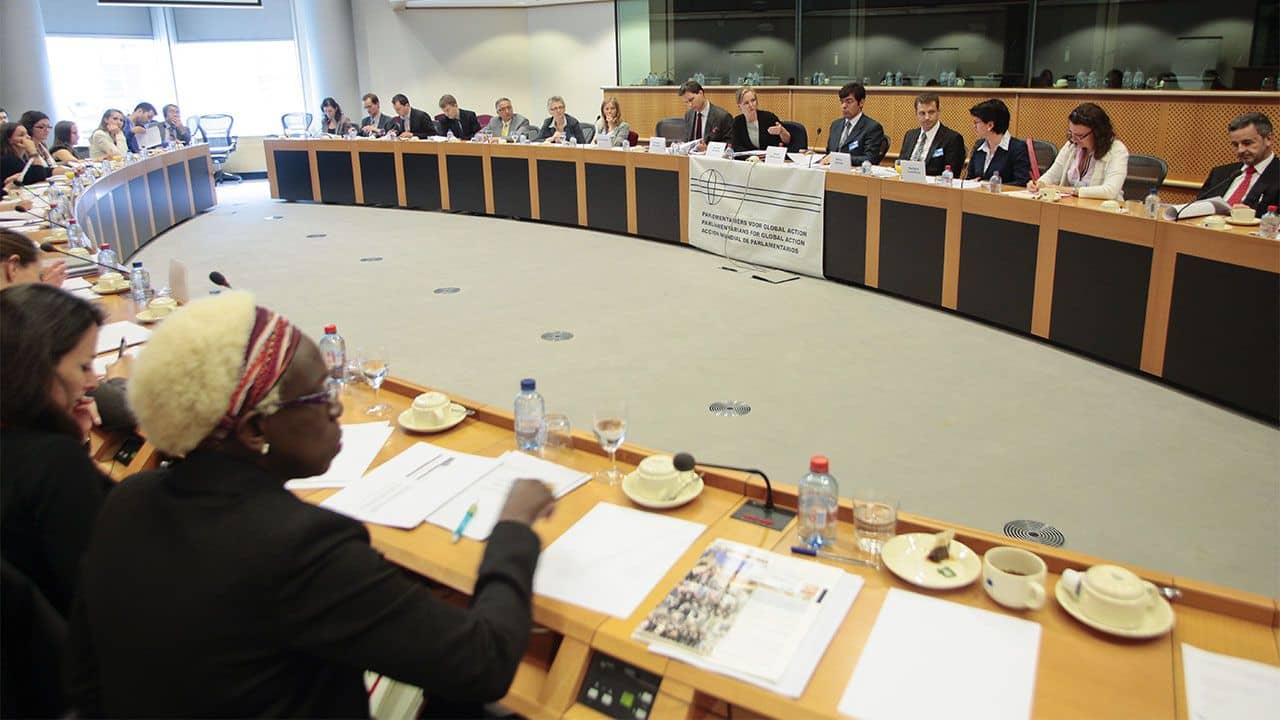
June 01, 2011 | European Parliament, Brussels, Belgium
Under the leadership of Ms. Marietje Schaake, MEP (Netherlands) and in collaboration with PGA, several MEPs as well as a delegation of NGOs and representatives from EU institutions gathered at this Roundtable to deliberate on and contribute to the new EU Action Plan on the ICC, which is intended to give effect to the 2011 EU Decision on the ICC.
In her capacity as Chair of the PGA Group in the European Parliament, Ms. Marietje Schaake opened this roundtable discussion, giving a short introduction on the framework of the meeting. Her remarks were followed by an opening statement by Ms. Barbara Lochbihler, MEP (Germany), Chair of the 'Friends of the ICC' in the European Parliament. Ms. Lochbihler outlined the importance of the continued fight against impunity and the role and contribution of the EU in this respect, pointing to ongoing encouraging developments in Argentina, Chile, Serbia, Egypt and Colombia as well as challenges still remaining in the fight against impunity worldwide (full speech).
In his intervention, Mr. Edward McMillan Scott, MEP (UK), Vice-President of the European Parliament, who recently joined PGA, urged the European Commission to augment the resources of the European Instrument for Democracy and Human Rights, which supports ICC related activities. Referring to the recent developments connected to the 'Arab spring', he expressed his belief that the ICC is gaining greater significance in this and other regions, thus expanding the reach of the ICC around the world. He emphasised the important role of the EU in the fight against impunity, not only in EU and ICC member states, but globally.
Mr. Richard Howitt, MEP (UK), Head of the EP Official Delegation to the Kampala Review Conference, reminded participants that some EU member states made certain pledges in Kampala. The majority of those pledges, however, were not as progressive as the Parliament would have wished. Mr. Howitt urged the member states to nevertheless fully implement the publicly announced pledges as soon as possible and called on the EU to integrate support for the ICC in all possible fields. Accordingly, the external diplomatic services should be used in relationship with all EU member and non-member states to include ICC related matters, for instance in negotiations for trade agreements with third states. Mr. Howitt also highlighted the importance of allocating a sufficient budget to the ICC directly (for instance by supporting the Trust Fund for Victims) as well as to supporting civil society organisations.
These interventions were followed by three statements on the role of the EU in support of the Rome Statute system. Mr. Matias Hellman, External Relations Advisor of the ICC Presidency, alluded to the important role which the EU is playing in support of the ICC and how the new EU Action Plan is an opportunity to put in place even more effective mechanisms to achieve concrete results. The EU Focal Point on the ICC, Dr. Christian Behrmann gave an overview of the five objectives which the revised EU common position on the ICC lays out and how the EU ICC Action Plan will address these objectives. Dr. David Donat Cattin, Director of the PGA International Law and Human Rights Program, laid particular emphasis on the need to strengthen domestic tools to end impunity and suggested a few paths to improve current difficulties of ICC member states in respect to their cooperation with the Court, including vis-a-vis insufficient domestic capacities.
During the ensuing discussion, participants raised various aspects related to the presentations and the EU's role in support of the ICC and the fight against impunity. Former EC Director at EuropeAid, Mr. Francesco De Angelis, pointed out the urgent need for the 27 EU States Parties to the Rome Statute to take measures to give effect to the Rome Statute by domestically implementing the relevant provisions on complementarity and cooperation with the Court. Ms. Ana Gomes, MEP (Portugal) reflected on upcoming challenges for the EU in the Arab region and the need for the EU to support the new justice systems emerging as a result of recent developments. Ms. Gomes also insisted that the Ratification Campaign of the Kampala Review Conference should be included by the EP in the new Report that is being prepared by Mr. Kreissl-Dorfler MEP (Germany), who was represented by two parliamentary staff members at the Roundtable. In the context of the International Criminal Tribunal for the Yugoslavia (ICTY), Ms. Sarah Ludford, MEP (UK) commended the recent arrest of Serbian General Ratko Mladic and the EU's role in that process, but in the context of the ICC, highlighted that challenges inherent in the effective enforcement of ICC arrest warrants remain and have to be addressed more efficiently.
The representatives of the EU Commissions' DGDEV European Instrument for Democracy and Human Rights' Section reiterated their commitment to further support national capacity building to strengthen the principle of complementarity and to continue financial contributions to the ICC and civil society.
Please find the full report of the proceedings here.
Past Events on the EU and the ICC:
- - October 2009: Conference on the ICC for the new European Parliament
- - January 2009: Consultations at the Parliamentary Assembly of the Council of Europe on Ratification and Implementation of Rome Statute - Debate on the Motion for a Resolution: "Cooperation with the ICC & its universality"

